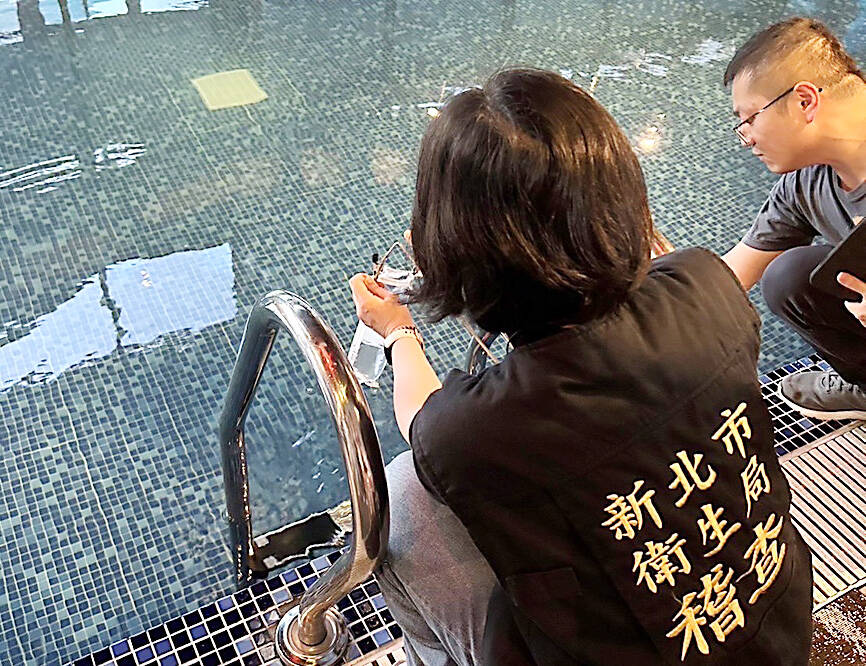A woman in northern Taiwan has died from a rare brain-eating amoeba, marking the nation’s first death from Naegleria fowleri in 12 years, health authorities said on Wednesday.
Experts urged against public alarm, saying the amoeba is susceptible to chlorine and does not spread easily.
Traces of Naegleria fowleri were found in the woman who died of meningitis, Centers for Disease Control (CDC) Deputy Director-General Tseng Shu-huai (曾淑慧) told a news briefing in Taipei.

Photo courtesy of the New Taipei City Department of Health
Infection caused by the rare microbe is 99 percent fatal, she said, adding that only two cases have ever been confirmed in Taiwan.
An indoor water park in New Taipei City that the woman had visited is being tested for Naegleria fowleri, she said.
The process could take between one and three weeks, as scientists have limited experience with the amoeba.
Samples taken from the park are being condensed for polymerase chain reaction tests and positive results would then be genetically sequenced, she said.
The pathogen dwells in fresh water, prefers high temperatures, can survive in heat of up to 46°C and briefly survive in temperatures higher than that, the CDC said.
This means the germ can be found in rivers, lakes, warm water discharged from factories, insufficiently chlorinated swimming pools and soil, it said.
People engaging in activities in or near bodies of water can be infected by inhaling droplets containing the amoeba, which then spread from the olfactory nerves to the brain, the CDC said.
The microbes cannot be spread by drinking contaminated water or via human contact, it said.
The incubation period for these germs varies from one to seven days, with symptoms including headache, fever, nausea, vomiting, neck stiffness, muscle spasms, altered psychological states, delusions and loss of consciousness, the CDC said.
People should try to avoid getting water in their nostrils when visiting hot springs or engaging in watersports, and should avoid immersing their heads or disturbing mud in the bottom of lakes or rivers, it said.
People who display symptoms of meningitis after playing in water should seek medical help immediately and disclose their contact history, the CDC said.
Hwang Kao-pin (黃高彬), deputy head of the infectious disease department at China Medical University in Taichung, yesterday told a news conference that the threat from Naegleria fowleri is limited.
Chlorine added to tap water and swimming pools neutralizes the amoeba, which is highly unlikely to be found in groundwater, he said, adding that surface water bodies are the main source of danger.
The microorganism poses a relatively higher risk to hot spring-goers due to their ability to withstand temperatures of up to 50°C, Huang said.
Brain infections caused by the amoeba are nearly impossible to cure, as it does not respond to antibiotics and diagnosis often comes too late, he said, adding that only one type of antifungal is known to have an effect.
Additional reporting by CNA

MAKING WAVES: China’s maritime militia could become a nontraditional threat in war, clogging up shipping lanes to prevent US or Japanese intervention, a report said About 1,900 Chinese ships flying flags of convenience and fishing vessels that participated in China’s military exercises around Taiwan last month and in January have been listed for monitoring, Coast Guard Administration (CGA) Deputy Director-General Hsieh Ching-chin (謝慶欽) said yesterday. Following amendments to the Commercial Port Act (商港法) and the Law of Ships (船舶法) last month, the CGA can designate possible berthing areas or deny ports of call for vessels suspected of loitering around areas where undersea cables can be accessed, Oceans Affairs Council Minister Kuan Bi-ling (管碧玲) said. The list of suspected ships, originally 300, had risen to about 1,900 as

Japan’s strategic alliance with the US would collapse if Tokyo were to turn away from a conflict in Taiwan, Japanese Prime Minister Sanae Takaichi said yesterday, but distanced herself from previous comments that suggested a possible military response in such an event. Takaichi expressed her latest views on a nationally broadcast TV program late on Monday, where an opposition party leader criticized her for igniting tensions with China with the earlier remarks. Ties between Japan and China have sunk to the worst level in years after Takaichi said in November that a hypothetical Chinese attack on Taiwan could bring about a Japanese

MORE RESPONSIBILITY: Draftees would be expected to fight alongside professional soldiers, likely requiring the transformation of some training brigades into combat units The armed forces are to start incorporating new conscripts into combined arms brigades this year to enhance combat readiness, the Executive Yuan’s latest policy report said. The new policy would affect Taiwanese men entering the military for their compulsory service, which was extended to one year under reforms by then-president Tsai Ing-wen (蔡英文) in 2022. The conscripts would be trained to operate machine guns, uncrewed aerial vehicles, anti-tank guided missile launchers and Stinger air defense systems, the report said, adding that the basic training would be lengthened to eight weeks. After basic training, conscripts would be sorted into infantry battalions that would take

DEEP-STRIKE CAPABILITY: The scenario simulated a PLA drill that turned into an assault on Taiwan’s critical infrastructure, with the launchers providing fire support Taiwan yesterday conducted this year’s first military exercises at Longsiang Base in Taichung, demonstrating the newly acquired High Mobility Artillery Rocket System’s (HIMARS) ability to provide fire support and deep-strike capabilities. The scenario simulated an attack on Penghu County, with HIMARS trucks immediately rolling into designated launch areas and firing barrages at the Wangan (望安) and Cimei (七美) islands, simulating the provision of fire support against invading forces. The HIMARS are supposed to “fire and leave,” which would significantly increase personnel and equipment survivability, a military official said. The drill simulated an exercise launched by the Chinese People’s Liberation Army (PLA) Eastern